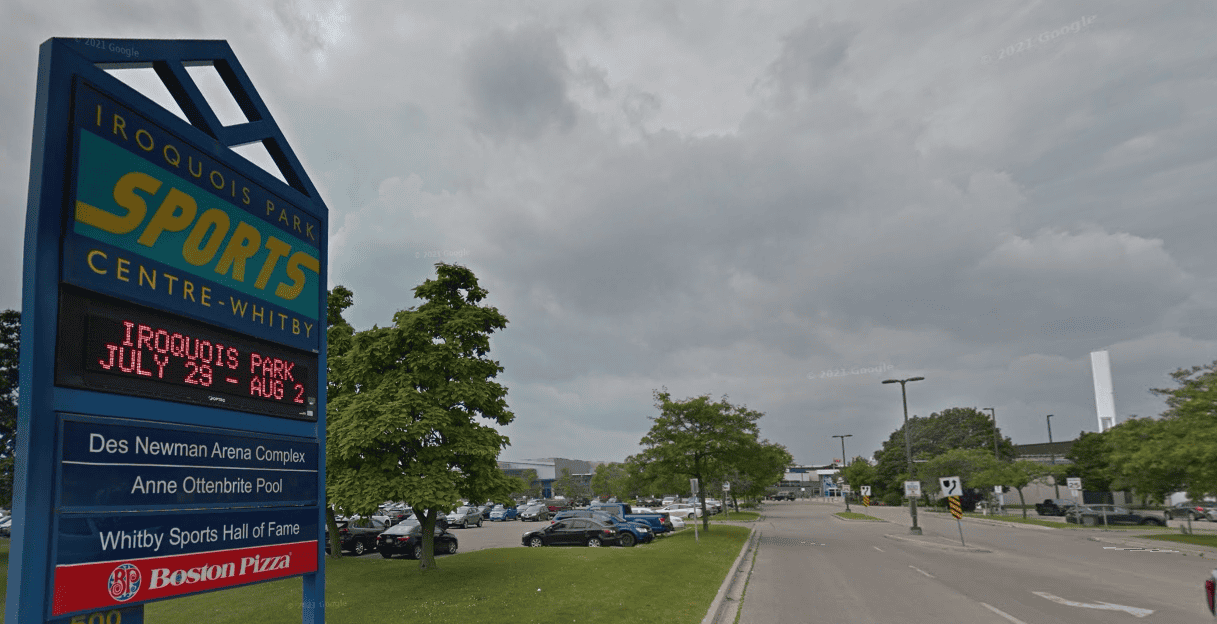Controversial sport centre name not a contentious issue in Whitby
Published May 1, 2024 at 1:48 pm

Whitby has not received any complaint about the use of the word “Iroquois” in the name of the Iroquois Sport Centre amid a growing controversy in Halton Region about the word’s use.
The word Iroquois was coined by early settlers in the 1600s to describe the Haudenosaunee peoples indigenous to the Great Lakes region in modern-day Canada and the United States. This grouping of Indigenous nations is now better known as the Six Nations in English.
The name recently became a bit of a flashpoint in Oakville after the Halton District School Board received a complaint from a community member about it. A spokesperson for the board told insauga.com that it knows the identity of the complainant but does not have permission to make their name public.
The school had used the name since opening in 1994, but following the complaint, the board decided to remove it.
The board estimated the cost of renaming the school to be about $25,000, though it may not cost much to rebrand. However, no money* has been assigned to the project. The move proved divisive in town, with some saying the name should stay and others supporting a more accurate update.
The board later rescinded its decision to allow more time to consult with the local Indigenous community namely the Six Nations of the Grand River and Mississaugas of the Credit First Nation, as well as Indigenous families in the board.
The controversy prompted Oakville town council to consider a similar move thanks to a recently discussed naming policy report. However, the town won’t fully examine the issue until the 2026-2027 fiscal year.
However, according to Mayor Elizabeth Roy, Whitby has no plans to follow to consider renaming the Iroquois Sport Centre.
“Whitby is committed to advancing the Truth and Reconciliation Commission of Canada’s Calls to Action and advancing equity and inclusion for all members of our community,” she told insauga.com in an email.
“I am aware of recent conversations that have taken place in Halton Region around the use of the word ‘Iroquois’ as well as the broader debate around renaming public spaces to better reflect and respect diverse communities.”
The confederacy of the Cayuga, Mohawk, Oneida, Onondaga, and Seneca peoples joined into a confederation c. 1100 or 1500 (dating theories vary) under the leadership of Deganawidah, the Great Peacemaker, Hiawatha and Jigonsaseh, the Mother of Nations. By 1700, the Haudenosaunee dominated much of modern-day Ontario, Quebec, New York, Pennsylvania, Ohio, Virginia and Kentucky. What is now New York hosted the Haudenosaunee capital, Onondaga.
While the origins of “Iroquois” remain historically obscure, one of the earliest uses comes from the writings of French colonist Samuel De Champlain. The explorer was among the first European colonists to reach the Great Lakes region. He ultimately made numerous trips to Canada and founded Quebec City, among other settlements.
Under Champlain, the French allied themselves with the Haudenosaunee’s local rivals, such as the Huron and Algonquin peoples. Meanwhile, the Haudenosaunee allied with the British. Numerous conflicts occurred during this period, including the century-long Beaver Wars over the fur trade.
During this period, French Jesuit missionaries studied the Haudenosaunee with bias, portraying the league as uncivilized and militarily aggressive. During this period, “Iroquois” gained a more negative, derogatory connotation but became the standard among settlers.
In 1722, the Tuscarora joined the group, and in 1776, the Haudenosaunee continued their alliance with the Crown. They fought against the American Revolution. When the Americans emerged victorious, they forced the Haudenosaunee up to Canada after Britain unilaterally surrendered their lands.
In the centuries since, “Iroquois” has remained the standard among settlers, though the Six Nations now refer to themselves as Haudenosaunee. As a result, numerous institutions in southern Ontario bear the name, including Oakville’s Iroquois Ridge High School, Clinic, and Library, Whitby’s Iroquois Sports Centre and Iroquois Beach, and Scarborough’s Iroquois neighbourhood and attached park.
Editor’s note: This article incorrectly stated the money had been assigned to the project. However, the board was simply provided an estimate. We regret the error. The article was also updated to include comments from the Halton District School Board.
With files from Steve Pecar and Jeffery Allen.
INdurham's Editorial Standards and Policies




